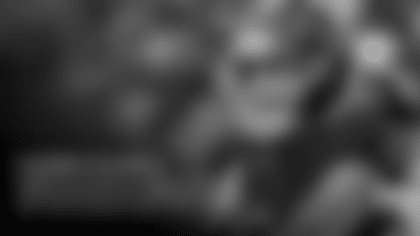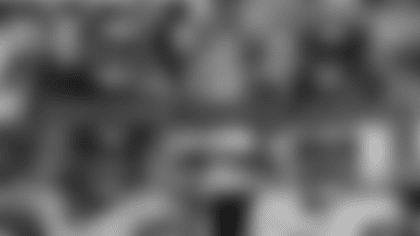The National Football League implemented a number of rule changes for 2018, but the one garnering most of the attention right now is the new helmet-hit rule.
Under the new rule, players who lead with their helmet to initiate contact against an opponent on any play will be penalized 15 yards. Offending players may also be disqualified depending on the severity of the hit. It's also worth noting that the rule applies to any player anywhere on the field.
RELATED CONTENT
"The goal here is to improve the game and protect the players while still playing a game and style we all want – one of toughness and physicality," Falcons coach Dan Quinn said.
So, what's all the fuss about? Implementing a rule that focuses on protecting players by discouraging them from leading with their helmets seems to be in everyone's best interest, right?
Those who tuned in to watch the Hall of Fame game last Thursday night between the Bears and Ravens saw the first call on the helmet-hit rule come into play. By game's end, the Ravens were flagged two times for unnecessary roughness under the rule and it left some wondering if this is how games are going to be called during the regular season.
Not everyone is pleased with the implementation of the new rule.
San Francisco 49ers cornerback Richard Sherman told The Wall Street Journal that the new rule could “ruin the game” if the penalty is called too much. Washington Redskins cornerback Josh Norman said in terms of fines, the new rule could also end up being costly for some players who refuse to alter the way they tackle. Even Ravens coach John Harbaugh, who praised the rule when it was passed, reportedly said that he now wants to study the calls more after seeing it in action.

One team that doesn't believe the new rule will affect the way they play or change the way they tackle is the Atlanta Falcons. It stems from a leveraged-based tackling technique that Quinn brought with him from his days as the defensive coordinator of the Seattle Seahawks.
Back in May, Falcons defensive coordinator Marquand Manuel put together a video presentation for the Atlanta media and Falcons beat reporters to explain the new rule and demonstrate how the Falcons teach players to tackle.
"We just have to do a better job of explaining exactly how we tackle," Manuel said. "You guys are going to see some of the drills that we show, implementing the fact of how you now take the helmet – not as a weapon – and utilize it as a safety tool. That means I'm now using my shoulder pad."
Manuel emphasized how having proper leverage and posture when making a tackle, block or initiating any sort of contact will be key – for the players' overall safety as well as avoiding penalties.
"The posture is what we're working on a lot – what hits first," Manuel said. "We cannot lead with the helmet. The helmet cannot be the first part of contact for anyone."
Manuel added that players like Keanu Neal won't be affected by the helmet-hit rule because "because we do it the right way in practice all the time."
Neal, who has compiled 153 tackles and 65 assists in his first two years in Atlanta, was named to his first Pro Bowl following last season. The Falcons safety also has a reputation for being one of the hardest hitters in the league right now.

Falcons linebackers coach Jeff Ulbrich doesn't expect the helmet-hit to rule to be an issue for players like Deion Jones, De'Vondre Campbell and Duke Riley, either. Ulbrich said that when it comes to tackling, the Falcons already teach their players to keep the head completely out of contact.
"We've taught this rugby-style tackle for quite a while now," Ulbrich said. "It's just going to be another level of mindfulness on the tackles where in the past it's been very hard to avoid the helmet-to-helmet."
The NFL released a fact sheet on the helmet rule which includes an official explanation of the rule and outlines the penalties for violating it. The league also created an educational series – called the NFL Way to Play – to promote proper use of the helmet to protect players from unnecessary risk and what it hopes will foster culture change across all levels of football.
When asked if the new rule would change his approach at all, Neal said it wouldn't. He said because of the way the Falcons teach tackling it allows him to play fast and within the rules.
"We do a good job of training different ways to tackle here," Neal said. "The Falcon roll – that's a technique that we mention all the time, that we practice, critique and really work on. There's things already implemented in what we do that kind of counteracts what the rule is saying.
"With my game, obviously I'm a physical player," Neal added. "I don't think too much about it when it comes to the rule because I play the way I play. You never want to think (while playing) because you end up playing slower."
Manuel stressed the importance of getting to the young players early, teaching them their tackling techniques "and continuously keeping them on the same path."

Five head coaches, including Atlanta Falcons coach Dan Quinn, volunteered to create position-specific videos – for ball carriers, offensive linemen, defensive linemen, linebackers and defensive backs – to assist in educating coaches and players on position-based applications of the new rule.
The Falcons will play their first preseason game on Friday, when they travel to East Rutherford, N.J., to take on the New York Jets at MetLife Stadium. When asked about how the new rule was enforced in the Bears-Ravens preseason game, Quinn said it's something the entire league will learn from.
"Those two examples I'm going to show in the team meetings, and then now this weekend when we're fully underway from the preseason standpoint, I'll try to pull good teaching examples and go," Quinn said.
"I'm hopeful that because of the way we taught tackling, to begin with, we'll get less, but let's be honest, we all need work at it. If we can help the game become safer and teach it better, and get it down to college and through high school and youth football that would be a huge win."













